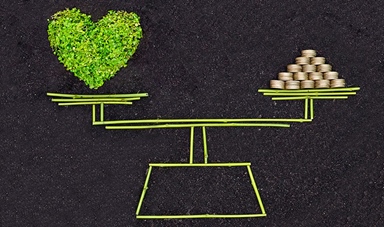Loading component...
At a glance
By Candice Chung
For years, making a profit and doing good in the world were regarded as separate – if not contradictory – objectives. The assumption was that corporate social responsibility (CSR) came at a cost; namely a less competitive business that resulted in lower investor returns.
In fact, “ethical” investments are consistently outperforming their more traditional counterparts in the broader market – busting the myth that doing good necessitates financial sacrifice.
“Over the last 10 years, the average responsibly invested share fund returned 6.3 per cent a year, compared with a 3.8 per cent annual return for the average large cap Australian share fund,” says Clare Payne, Tobacco Free Portfolios' global strategy chief and co-author of A Matter of Trust: The Practice of Ethics in Finance.
It is a global trend. A report by Deutsche Asset & Wealth Management and Hamburg University on 2000 empirical studies found a strong correlation between implementing good environmental, social and governance (ESG) principles and sound financial performance.
“Investors are seeing that ethical investments can perform well, particularly over the longer term, as they factor in more risk factors than portfolios focused on the short-term,” Payne says.
“Four out of five Australians would consider switching their super or other investments if their fund engaged in activities that did not align with their values.”
What cynics once saw as “bleeding heart” concerns are key topics in boardroom discussions. Major institutional investors are paying close attention to companies’ hiring practices, treatment of workers and their social and environmental footprint.
In Australia, nearly one in two investor dollars is spent on a responsible investment strategy. Nine out of 10 consumers expect their superannuation to be invested ethically, according to a 2017 Responsible Investment Association Australasia (RIAA) survey.
What counts as ethical investment?
“Traditionally, ethical investment has been very much around products that are negatively screened for [harmful] issues or industry types, such as tobacco, gaming or armaments,” says Pablo Berrutti, head of responsible investment Asia Pacific at Colonial First State Global Asset Management.
Nowadays, the focus has moved beyond specific product types to a more objective and measured look at the ethics of investing.
“From stewardship codes, to the growing demand from millennials for more sustainable investment products, all of these things are driving us to reassess our purpose in society,” Berrutti says.
“We’re still investors, and we’re still focused on making money for our clients, but I think there’s an increasing demand that we do this in the right way.”
The RIAA rates fund managers on how well they disclose their responsible investment approach to the public. It also provides product certification for funds considered ethical or sustainable. In addition, research companies such as Morningstar have started providing sustainability ratings for various funds.
“Increasingly, we’re seeing that yes, of course you have to have a good process in place, but the proof is in the pudding and you need to demonstrate that your portfolio is consistent with what you’re trying to achieve,” Berrutti says.
Measuring ethics in ethical investments
While measurement of ethical credentials is still in its infancy, what is clear is that there is a huge appetite for investments that deliver positive social and environmental outcomes. In the past three years, ethical investments have more than quadrupled to A$622 billion in Australia, according to the latest Responsible Investment Benchmark report.
“Four out of five Australians would consider switching their super or other investments if their fund engaged in activities that did not align with their values,” Payne says.
“This is because there’s a broader trend in society that recognises there are big global issues – environmental, income inequality, poverty – that require global collaboration to solve, and the finance sector has a role to play. Individuals are also motivated to ensure they are doing what they can and that their investments are not having an adverse impact on the world.”
Besides a measurable shift in social attitudes, Berrutti believes the “coming of age” of the superannuation pool is also fuelling the growth of ethical funds.
“Compulsory superannuation is 20 to 30 years old now, so it’s become a very significant savings pool. People are looking at that A$2 trillion in superannuation and asking the question: what does that money do in the world? This links back to clients not only wanting to see their money generate a return but also create some good in society.”
Where to from here?
One of the fastest growing areas of responsible investment is impact investing. This includes securities such as social benefit and green bonds – investments that aim to achieve measurable social or environmental goals alongside financial returns.
Research published by RIAA and Swinburne University’s Centre for Social Impact found the Australian market for impact investing has soared fourfold to A$6 billion in just under three years.
Of the 51 investment products studied, a diverse range of social benefits were measured, including 700 vulnerable families assisted, 369 employment pathways or jobs created, 22,688 students supported, and 950 megalitres of water delivered to wetlands, creeks and other ecosystems.
Ultimately, there’s a simple reason for paying attention to where our investment dollars go.
“Investment fuels the businesses that have the biggest impact on our world,” Payne says. “If investment goes to good companies, we will all be better off.”

